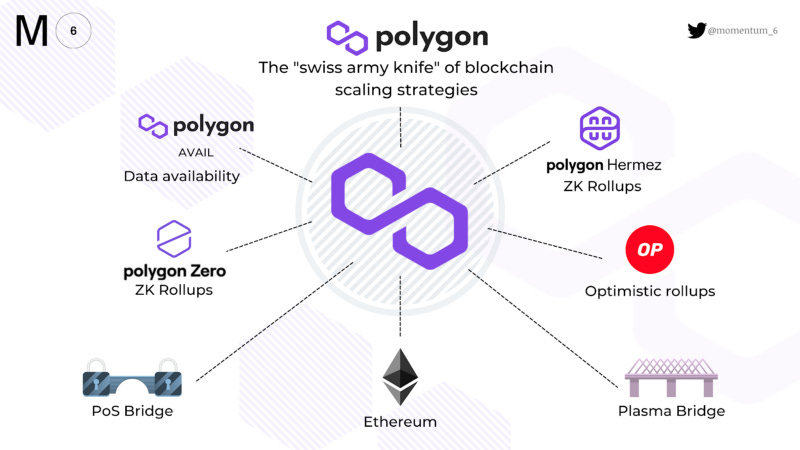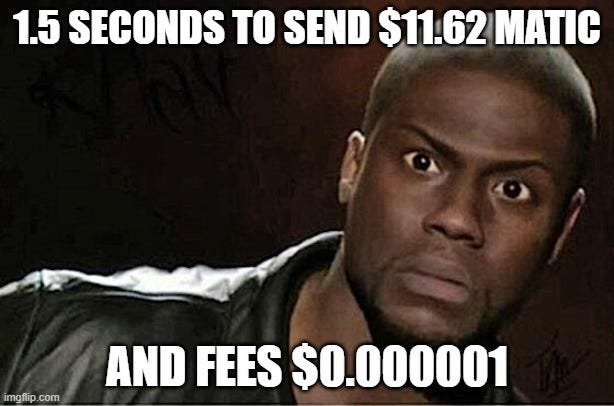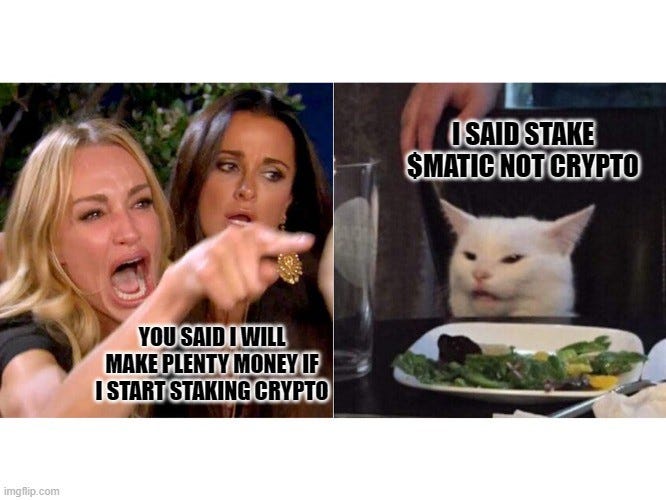Polygon Overview: Layer 2 or Sidechain?
A scaling solution whose aim is to provide multiple tools to reduce the cost and complexities of blockchains while improving txn speeds.
Overview
Polygon is a scaling solution whose aim is to provide multiple tools to reduce the cost and complexities of blockchains while improving transaction speeds. It is a framework for building interconnected blockchain networks.
Ethereum, a platform home to various dApps, is central to Polygon’s vision. These decentralized apps have made it easy for users to interact with new financial products, buy art pieces, play games, and even join virtual worlds. However, the amount of activity on Ethereum causes network clogs and raises the cost of transactions.
Polygon seeks to address some of the challenges that face the Ethereum network, such as high transaction costs and lack of community governance, by providing a sidechain solution. Polygon is a Layer 2 solution built on Ethereum. This sidechain is not an “Ethereum killer” but was created to help Ethereum expand in efficiency, security, size, and usefulness.
How it works
Polygon is no different from other proof-of-stake platforms with staking, governance, and network nodes. The Polygon Protocol connects all the blockchains that are based on Polygon. The same protocol also connects these blockchains to the Ethereum network to tap into Ethereum’s security model.
Polygon’s Scaling Solutions
Polygon has various scaling solutions, and users are at liberty of selecting the scaling solution that suits them best. Some of these solutions are already working, while others are still developing.
Polygon Proof-of-Stake Consensus
Instead of relying on the classic Proof-of-Work (PoW) algorithm, which consumes a lot of power when creating new blocks, Polygon uses Proof-of-Stake (PoS) consensus, which comprises a set of node validators to verify and validate transaction blocks. The major difference is that validators must engage in work (computations) in PoW networks while token holders validate and verify transactions in a PoS protocol.
Users are rewarded $MATIC, the native token in the Polygon ecosystem. You can earn $MATIC through any of the following approaches:
Become a validator. You can commit to the network and run a full node that validates transactions on the blockchain. You get a cut of $MATIC and fees when a validator. Your $MATIC can be slashed when you act maliciously or slow.
Become a delegator. A public node that receives $MATIC from others to help the protocol conduct Proof-of-Stake validation. The delegator’s voting power depends on the size of the delegated stake. Becoming a delegator is easier than being a validator.
Polygon Edge
Polygon Edge is an extensible and modular framework for developing Ethereum-compatible sidechains, blockchain networks, and general scaling solutions. The primary role of this framework is to bootstrap a new blockchain network while providing full compatibility with Ethereum transactions and smart contracts. It utilizes a centralized bridge solution to support communication with multiple blockchains, enabling the transfer of ERC-20 and ERC-721 tokens.
Polygon Hermez
Polygon Hermez is a decentralized L2 scaling solution based on cryptographic zero-knowledge proofs. The product is designed to provide validation and fast finality to off-chain transactions. Hermez 1.0 is already up and running, and the team is working on Hermez 2.0, which will be an Ethereum complete emulation in a zero-knowledge virtual machine.
Polygon Nightfall
Polygon Nightfall is a privacy-focused rollup for enterprises. The product is already in the testnet stage. It is a one-of-a-kind privacy rollup that combines zero-knowledge (ZK) and Optimistic rollups cryptography to create a scalable transactions solution.
Polygon Avail
Avail by Polygon is still in the development phase and is a general-purpose scalable data availability layer. Different execution environments such as sidechains, standalone chains, and off-chain scaling solutions can utilize this data availability layer.
Polygon Zero
Polygon Zero (still under development) utilizes the speed of Plonky2 to launch a scalable and more decentralized ZK Layer 2 (L2). The product features rollup and validium modes, meaning users enjoy higher speeds and lower fees.
Polygon Miden
Polygon Miden is a general-purpose zero-knowledge rollup and is also STARK-based. The solution rolls up thousands of L2 transactions into a single Ethereum transaction, eventually reducing transaction fees and increasing throughput.
How can you use Polygon?
Polygon performs most of the tasks you enjoy from Ethereum but avoids the low throughput and high transaction fees. Polygon started as a simple scaling solution, but it has now evolved to a broad ecosystem with various use cases.
Developers can now use decentralized apps, launch Ethereum-compatible blockchains, become node validators/delegators, mint NFTs and stake $MATIC. We can already see various successful projects on Polygon, such as yield generating protocols (Curve Finance and Aave), top NFT marketplace (OpenSea), and decentralized exchanges (SushiSwap).
Instead of Ethereum, you can use Polygon as the base blockchain for these protocols. On OpenSea, for instance, you can select Polygon as the main network and use it every time you want to trade non-fungible tokens. You only need a Polygon-compatible wallet such as MetaMask before you get started.
Polygon’s Software Development Kit (SDK)
Polygon SDK is a collection of plug-and-play tools developers can use to create and launch fully customizable DeFi apps and blockchains. The main idea behind this SDK is to make Ethereum a fully-fledged multi-chain system and help developers create different projects easily.
Polygon’s SDK aims to boost the Ethereum ecosystem through three core concepts; Ethereum compatibility, extensibility, and modularity. It is a flexible framework for developers keen on adopting Ethereum infrastructure and scaling solutions.
There are two types of Polygon SDKs. The first one is built for standalone chains that are Ethereum-compatible, which are standalone blockchains in charge of their security and modules. Such chains can use the Polygon bridge to communicate with Ethereum while maintaining independence. The second type of SDK supports other chains, like L2s, with developers’ tools and modules.
Polygon Bridge
A PoS bridge is needed to transfer assets from Ethereum to the Polygon network. The PoS bridge is a set of smart contracts that helps users transfer assets from the Ethereum Mainnet to the Polygon sidechain. It is the network’s backbone that allows users to transfer assets and interact with the apps and blockchains in the larger Polygon ecosystem. Transferring assets from Ethereum can be expensive, but it’s cheaper when you are on the Polygon network.
History
Polygon was founded in 2017 as Matic Network. It was the brainchild of experienced Ethereum developers Jayant Kanani, Anurag Arjun, Sandeep Nailwal, and Mihailo Bjelic. Plasma was the leading blockchain scaling solution in 2017. Therefore, Matic adopted a Plasma-driven scaling approach and PoS sidechains that assisted Ethereum as its demand rose. Matic’s proof-of-stake became one of the most prominent scaling options for most decentralized apps at that time.
The platform held an IEO on Binance in 2019, where it raised $5.6 million in ETH from the sale of $MATIC. The Matic Network went live in June 2020 with a Plasma Chain and PoS Chain with some of the top games brought to Matic towards the end of 2020.
Matic rebranded to Polygon in February 2021 and became more than a scaling solution for Ethereum. The platform was ready to onboard major DeFi protocols two months after the rebranding. The team believed that several scaling solutions could co-exist and was on a mission to create an infrastructure to make this a reality.
The team launched Polygon Studio and Polygon Edge in Summer 2021. During that time, Polygon Avail also launched as a rollup. The Polygon Maiden launched in November 2021 as a ZK-STARK scaling solution.
MATIC Token
Even after rebranding, the team decided to keep $MATIC as the native token that powers the entire Polygon ecosystem. The rebranding boosted its growth in price as the protocol also implemented new features. $MATIC is now among the top 20 currencies in terms of market capitalization. MATIC token has three primary use cases in the Polygon ecosystem:
Gas token. Whenever you conduct a transaction on Polygon or use a Polygon-based application, you will pay a small fee in $MATIC. This fee incentivizes various miners to process and verify the transaction you are trying to conduct.
Governance. Those who hold $MATIC tokens have some special privileges. $MATIC can be used on Polygon Improvement Proposals (PIPs) for governance voting to decide on Polygon’s direction.
Network security. Polygon’s PoS mechanism uses staked MATIC tokens to reach a consensus on the network. As a user, you can stake $MATIC and contribute toward securing the network while earning rewards. The approach ensures that users don’t act dishonestly as the risk of losing the staked MATIC tokens exists.
Polygon Studios
Blockchain gaming is a new wave, and Polygon will not be left out of the race. Polygon Studios, a unit focused on growing Blockchain gaming and NFTs, was launched in July 2021. Polygon created this studio to bridge the gap between Web 2 and Web 3 gaming.
The division seeks to attract big franchises and brands looking to launch NFTs and games on a secure protocol while maintaining scalability. Data from Polygon shows that more than 100,000 gamers are already on the protocol and more than 500 dApps running.
Polygon Gaming Studios helps developers create blockchain-enabled games. On the other hand, Polygon NFT Studio helps develop custom NFT models and marketplaces. Ryan Wyatt, who was YouTube’s Head of Gaming for seven years, is Polygon Studios CEO.
Team
Jayant Kanani, Co-Founder of Polygon Technology
Kanani is an experienced Blockchain engineer. His interest in crypto started when he considered Bitcoin/Ethereum as viable payment options for Game of Theories. People could wager real money on TV series/movie theories in this setup. He has previously held other roles as a Data Scientist, Senior Software Engineer, and Software Artisan with various companies.
Sandeep Nailwal, Co-Founder of Polygon Technology
Sandeep is an entrepreneur and software engineer. He served as the Chief Operating Officer of Matic/Polygon from November 2017 to December 2021. Before co-founding Polygon, Sandeep co-founded ScopeWeaver.com, serving as the CEO.
Anurag Arjun, Co-Founder of Polygon Technology
According to his LinkedIn profile, Arjun has various tasks at Polygon, such as defining the product’s roadmap and acting as a bridge between Economics, Research and Engineering functions, and API documentation. Before joining Polygon, he worked as a project manager with various companies.
Mihailo Bjelic, Co-Founder of Polygon Technology
Mihailo is an Information Systems Engineer. He graduated from the University of Belgrade with a degree in Information Systems Engineering.
Grants
Polygon Grants Hackathon
Polygon Grants Hackathon was the first Polygon-centric grant hackathon. The hackathon was co-organized and hosted by DoraHacks towards the end of 2021 and attracted 137 Polygon native projects that competed for $100k in prizes. These prizes were split between the Quadratic Funding Pool and the Judge Pool.
The hackathon was created to encourage early-stage ventures worldwide. Projects were given a chance to show their demos to the community. The top 3 projects that got community funding were:
Energy8: A Polygon integrated solution for game servers owners enables players to earn crypto while playing their favorite computer games, such as Minecraft.
Symphony Finance: A protocol where users can create limit orders by simply depositing the SELL asset with multiple profit-maximizing strategies.
Zeromatic. A protocol for a private payment system, Zpayments. Polygon powers Zpayments, where users can send and receive money anonymously and securely.
Financing Rounds
Polygon recently raised $450 million through a venture financing round led by Sequoia Capital India. Polygon has a market cap of about $13 billion, a first for a venture-backed Ethereum scaling solution. The funds will be used to hire more developers to build more scaling solutions. Polygon will also use these funds to build larger developer ecosystems in several markets.
$100 Million DeFiforAll Fund
Polygon launched the #DeFiforAll Fund in the first quarter of 2021 to onboard “the next million users” to DeFi. The funding is in MATIC tokens and will be deployed over the next 2 to 3 years.
Wrapping up
Even though we have seen tons of projects that have been dubbed “Ethereum killers,” Polygon is not one of them. Polygon has a multilayer system that makes it easy to verify transactions while still depending on Ethereum’s security. Its advanced dApp infrastructure gives a competitive advantage as existing Ethereum projects can easily port their code on Polygon, enabling new projects to launch on-chain.
—
Have an early-stage blockchain startup or even an idea for one without a team? Momentum 6 is an early-stage fund focused primarily on decentralized finance, Web 3.0, gaming and metaverse, and NFTs.
Incubation (M6 Labs)
• We leverage our deep knowledge of blockchain and past experiences building successful startups to build market-leading companies. Submit your idea or startup for incubation here.
Investment (M6 Ventures)
• We have successfully invested in over 130+ blockchain startups. Our diverse portfolio shows that we have positioned ourselves as one of the leading investment firms.
Research (M6 Labs)
• We use our unique approach and analysis to produce quality research surrounding industry trends and opportunities: https://t.me/M6bullets.
Portfolio (135+ Projects)
Managing Partner: Garlam Won
Head of Labs: Kadeem Clarke










